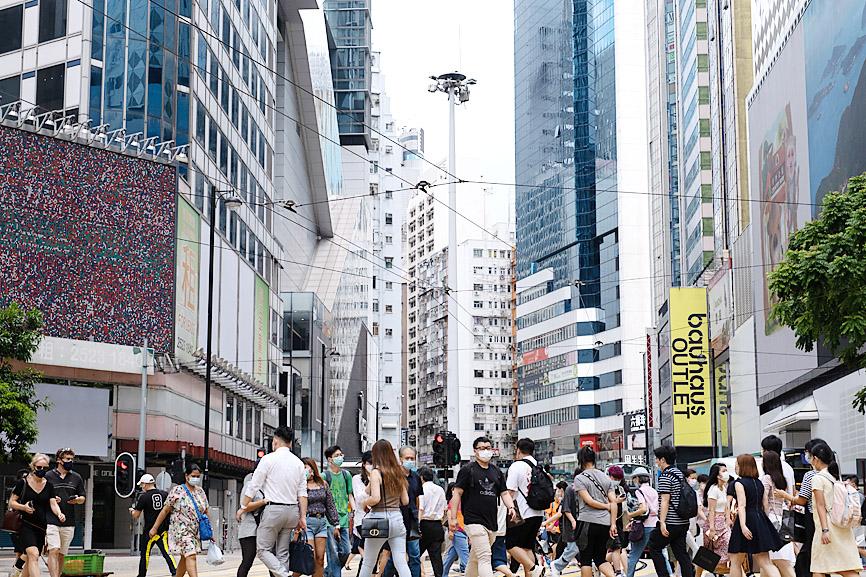Hong Kong police have been granted sweeping new powers, including the ability to conduct raids without a warrant and secretly monitor suspects, after controversial security laws were imposed on the territory by the Chinese government.
The powers allow for the confiscation of property related to national security offenses, allow senior police to order the takedown of online material they believe breaches the law, and grant police permission to intercept communications and conduct covert surveillance.
They also allow police to enter and search premises for evidence without a warrant “under exceptional circumstances,” to restrict people under investigation from leaving Hong Kong, and to demand information from foreign and Taiwanese political organizations and agents on their Hong Kong-related activities.

Photo: Bloomberg
The details of the implementation rules took effect yesterday and details were released after the Committee for Safeguarding National Security of the Hong Kong Special Administrative Region, chaired by Hong Kong Chief Executive Carrie Lam (林鄭月娥), convened its first meeting on Monday.
Before the release of the implementation rules, Facebook, WhatsApp and Telegram said they would deny law enforcement requests for user data in Hong Kong as they assess the effect of the national security legislation.
Lam told “radicals,” who she said had brought danger to the country, “not to challenge the law or the consequences would be serious... If people are law-abiding and never think about endangering national security, there is no cause for concern ever.”
Asked about widespread concerns among local and foreign media that the laws put them at risk by criminalizing acts of journalism, Lam said it was “not a question of me giving a guarantee on what you may or may not do.”
“If [the Hong Kong Foreign Correspondents’ Club] or reporters in Hong Kong can give me 100 percent guarantee that they will not commit offenses under this legislation, then I can do this,” she said.
She accused foreign press and governments of stoking fear, saying the new laws were “not doom and gloom,” and she had not noticed fear among residents.
“This law only targets four types of urgent matters,” she said repeatedly. “It does not undermine the rights and freedoms of people in Hong Kong.”
The day before, eight people were arrested at a silent protest where demonstrators held up blank pieces of paper at the Kwun Tong shopping mall.
They were protesting against the outlawing of pro-independence slogans, including “Liberate Hong Kong, the revolution of our time.”
The official Procuratorial Daily yesterday announced that China had launched a special task force to increase political policing to maintain social stability on the mainland.
The task force would “crack down on all kinds of infiltration, subversion, sabotage, violent terrorist activities, ethnic separatist activities and extreme religious activities,” according to the undated notes from a meeting of the task force published in the paper on Monday.

The Central Election Commission has amended election and recall regulations to require elected office candidates to provide proof that they have no Chinese citizenship, a Cabinet report said. The commission on Oct. 29 last year revised the Measures for the Permission of Family-based Residence, Long-term Residence and Settlement of People from the Mainland Area in the Taiwan Area (大陸地區人民在台灣地區依親居留長期居留或定居許可辦法), the Executive Yuan said in a report it submitted to the legislature for review. The revision requires Chinese citizens applying for permanent residency to submit notarial documents showing that they have lost their Chinese household record and have renounced — or have never

A magnitude 5.6 earthquake struck off the coast of Yilan County at 12:37pm today, with clear shaking felt across much of northern Taiwan. There were no immediate reports of damage. The epicenter of the quake was 16.9km east-southeast of Yilan County Hall offshore at a depth of 66.8km, Central Weather Administration (CWA) data showed. The maximum intensity registered at a 4 in Yilan County’s Nanao Township (南澳) on Taiwan’s seven-tier scale. Other parts of Yilan, as well as certain areas of Hualien County, Taipei, New Taipei City, Taoyuan, Hsinchu County, Taichung and Miaoli County, recorded intensities of 3. Residents of Yilan County and Taipei received

Taiwan has secured another breakthrough in fruit exports, with jujubes, dragon fruit and lychees approved for shipment to the EU, the Ministry of Agriculture said yesterday. The Animal and Plant Health Inspection Agency on Thursday received formal notification of the approval from the EU, the ministry said, adding that the decision was expected to expand Taiwanese fruit producers’ access to high-end European markets. Taiwan exported 126 tonnes of lychees last year, valued at US$1.48 million, with Japan accounting for 102 tonnes. Other export destinations included New Zealand, Hong Kong, the US and Australia, ministry data showed. Jujube exports totaled 103 tonnes, valued at

BIG SPENDERS: Foreign investors bought the most Taiwan equities since 2005, signaling confidence that an AI boom would continue to benefit chipmakers Taiwan Semiconductor Manufacturing Co’s (TSMC, 台積電) market capitalization swelled to US$2 trillion for the first time following a 4.25 percent rally in its American depositary receipts (ADR) overnight, putting the world’s biggest contract chipmaker sixth on the list of the world’s biggest companies by market capitalization, just behind Amazon.com Inc. The site CompaniesMarketcap.com ranked TSMC ahead of Saudi Aramco and Meta Platforms Inc. The Taiwanese company’s ADRs on Tuesday surged to US$385.75 on the New York Stock Exchange, as strong demand for artificial intelligence (AI) applications led to chip supply constraints and boost revenue growth to record-breaking levels. Each TSMC ADR represents